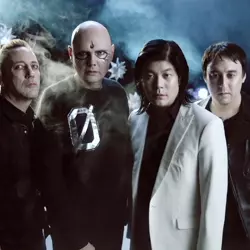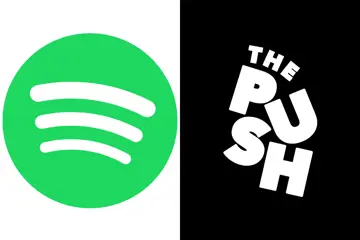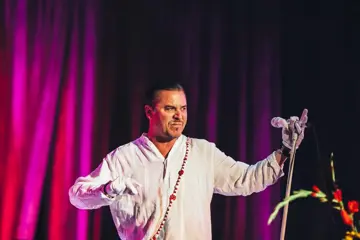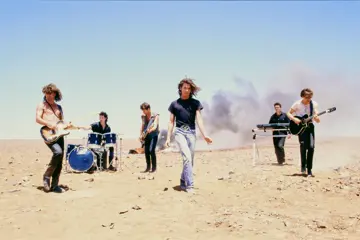 The Smashing Pumpkins
The Smashing Pumpkins“I'll piss on Radiohead.” So goes the headline published last week in NME, which quickly made its way around the world in terrifying rapidity. And of course it did; Billy Corgan has become one of the most outspoken musicians of the last 25 years. Every little quote said by the Smashing Pumpkins frontman and effective centre has been constantly published to the extent that the myth belies the man. Billy Corgan – the media personality – has become the go-to resource for all information regarding The Smashing Pumpkins, even to the extent that his music is largely ignored, in many respects. Which is a shame, because since becoming big with the original incarnation of the Pumpkins, all Billy Corgan has strived to do, in his own words, is be honest.
Corgan is in the middle of press duties in support of his new album, Oceania, when we catch up with him. “It's crazy busy at the moment,” he begins in a casually friendly tone. “I've been overwhelmed, honestly. It's the good kind of busy, because the response to the album has been so positive. I've been under a lot of demand, but in between all of that I'm still trying to rehearse with the band and take care of my dogs,” he laughs. “You know, I've still got a life going on in between trying to rebuild some kind of public image.” And that public image has once again taken centre stage in Corgan's life as he prepares to launch Oceania and once again tour the world. Whilst he's been working on his epic Teagarden By Kaleidyskope project in recent times, he's been quietly releasing singles online, and has not garnered a huge amount of attention. Oceania is set to change that. “It's probably my biggest album in 15 or 20 years,” he admits. “I don't think it would have existed without me taking Teargarden on because the process of doing one song at a time allowed us to gauge either the ambivalence or interest of our audience. I would put out a song, and not necessarily think it was the greatest thing I've ever written. But I would see fans destroy it because it wasn't what they wanted. The whole project has allowed me to understand the psychological nature of our audience in a way that an album doesn't.”

Billy Corgan
It is that nature that has seen Billy Corgan constantly reacting to the pressures of the music industry and media. It's something that has gradually changed for him during his career, thanks in particular to the challenge of fronting two completely different versions of The Smashing Pumpkins. “It's a little bit like apples and oranges,” he contemplates when asked how his current work differs from the band that put out albums like Siamese Dream and Mellon Collie And The Infinite Sadness. “Beyond the obvious thing of working with different people, there are different objectives and different cultural pressures now. The simplest way to answer the question would be that I feel that the original version of the Smashing Pumpkins was the right band for the time, and this band is the right band for this time. I don't think this band could've done what the old band did back in the day, and the old band couldn't have done what the new band's doing today.
“[The old band] was going for years, and I would've preferred that we stayed together, because I think that's something that happens with any long-term relationship,” he admits. “But the relationship really started falling apart in the mid-'90s, so whenever people talk about the old band, from my perspective… I mean, I haven't been in that band for about 16, 17 years. It was a great time, we made a lot of great music, and I honestly really appreciate that people are still so interested in that. It makes me proud and I'm glad that we worked hard to make strong records that can still hold up to modern ears.” That being said, Corgan has always maintained the notion that music should not be compared to it's past, and that he will keep following his path despite any criticism. “I really love the situation I'm in now, I love the music we're making, and I think that's ultimately all that matters at the end of the day,” he continues. “What existed of the old band, whether it's on video or CD or whatever, there's plenty there to explore while I'm still having a completely different experience today. So I don't think one thing negates the other in any way.”
Don't miss a beat with our FREE daily newsletter
The attribute of longevity, as expressed by Corgan himself and those that would pay attention to his work, has played a large part in his life and has come under fire numerous times. Following the very public breakup up of the original Pumpkins in 2000, Corgan went on to form the short-lived Zwan, which was almost unanimously panned by the media. For a while, he was largely forgotten by the public, until 2005 when he posted an ad in Chicago's Tribune and Sun-Times, admitting that he wanted his band back. And so followed Corgan's return, a process that was surely due to his tenacity. “Well, I think the root of that is that my father was a musician,” Corgan tells when asked what's kept him going for so long. “I think if I hadn't of had that growing up, I might've had a different view of music and what it means to be a musician. My father had a very particular set of opinions on how a musician should think and how they should live. I think that sort of guided me through the ups and the downs, which of course are inevitable in any kind of career. I think at the centre of my philosophical direction is that a sense that I'm a musician first and everything else second.
“In the world I grew up in – working-class Chicago – you took pride in your work, and you deserved a good wage, and you deserved to be recognised for doing a good job,” he argues. “There was no shame in being a skilled carpenter or something. I had an uncle who worked on the Sears Tower, which at the time was the highest building in the world. He got paid some crazy amount of money per hour because he was willing to walk on a steel beam a mile up in the air,” he states, before bringing the conversation back to the current state of the industry. “You find you get caught in between these two worlds which really don't care about music as much as they care about how to portray music. If you're just a musician, it's not any different to the guy who plays his guitar in the street and puts his hat in front of you. If you want to give him some money, great; if you don't, then you just walk on by. Somehow, it's been twisted around so that's now a bad thing.” So, with such an opposed view of the music industry as a whole, one could assume that Corgan is as willing as anyone to separate himself from the constant cycle of marketing and media coverage. In fact, he admits that it is a necessary part of his career. “I think at the end of the day, you still have to figure it out, because the world is moving too fast,” he considers. “You can do something of incredible quality, but if you don't figure out how to interface with the mainstream system on some level, it's just going to blow right past you. It's not personal; it's not like somebody's ignoring you on purpose. There's just too much going on.
“I think the new buzzword for the music business would be 'marketing'. Which is code for, 'How do we get people to know that this exists and create a situation where they might be interested in buying it, without spending a whole lot of money?'” Corgan laughs. “So what do most people do? They do dumb shit; they create headlines. They light themselves on fire, they run down the street naked, they pull down their pants at a concert. Anything to get a headline so people can read it or click on it. I feel like I'm one of the few people willing to stand up in the middle of it and say that it's all full of shit. And, of course, what do they do? They don't attack my ideas, they attack me. They attack my crooked teeth or whatever. They can't actually attack my ideas, because I've been around long enough to know the difference.
“All that negativism doesn't have a point. It's like walking down a street, and a girl walks by you who's 20 pounds overweight, and you go, 'Oh, you fat cunt'. You just learn to ignore it.”















